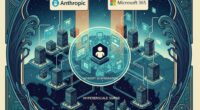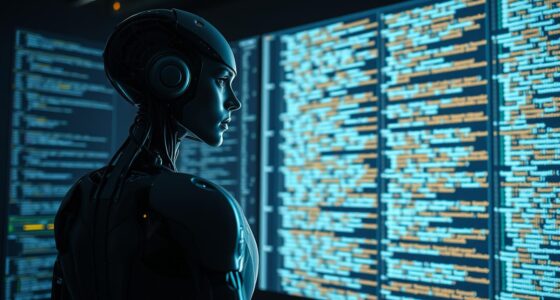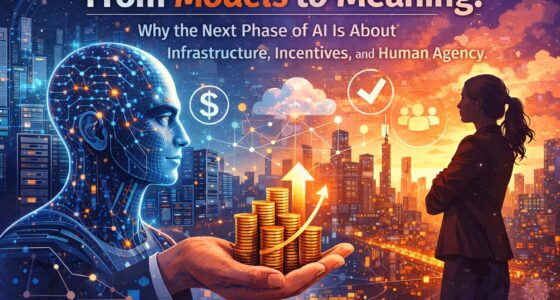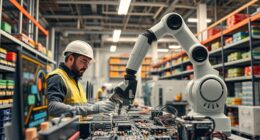As AI takes over routine jobs, your purpose shifts from manual work to creativity, relationships, and personal growth. You’ll find more time for innovation and meaningful experiences as automation frees you from repetitive tasks. Embracing this change means redefining your identity and values, focusing on emotional intelligence and ethical choices. To understand how to navigate this new landscape and reveal human potential beyond labor, explore further insights ahead.
Key Takeaways
- AI shifts focus from work to creativity, relationships, and personal growth, redefining human purpose beyond labor.
- Increased AI efficiency frees time for innovation, learning, and meaningful experiences, fostering a post-labor society.
- Human traits like emotional intelligence and empathy become essential as AI automates routine tasks and dehumanizes roles.
- Redefining purpose involves exploring intrinsic values such as community, spirituality, and personal fulfillment.
- Ethical governance and transparency are crucial to ensure AI enhances human agency and societal trust.
The Shift From Labor to Purpose in the Age of AI

Have you ever wondered how AI is changing what gives our lives meaning? As AI takes over routine tasks, you might find yourself rethinking your purpose beyond work. With about half of white-collar jobs at risk, your traditional role could shift drastically. The focus may turn away from labor toward creativity, relationships, and personal growth. AI’s efficiency boosts mean you’ll have more time for pursuits that truly matter—innovating, learning, and connecting. This evolution underscores the importance of mindful decluttering, encouraging you to prioritize meaningful possessions and experiences over material accumulation. This shift challenges you to redefine life’s purpose beyond employment, emphasizing social and emotional skills that AI can’t replicate. As AI transforms industries, it pushes you to explore new ways to find fulfillment, prioritize human connection, and develop a deeper sense of identity in a rapidly changing world.
Redefining Human Identity in a Machine-augmented World
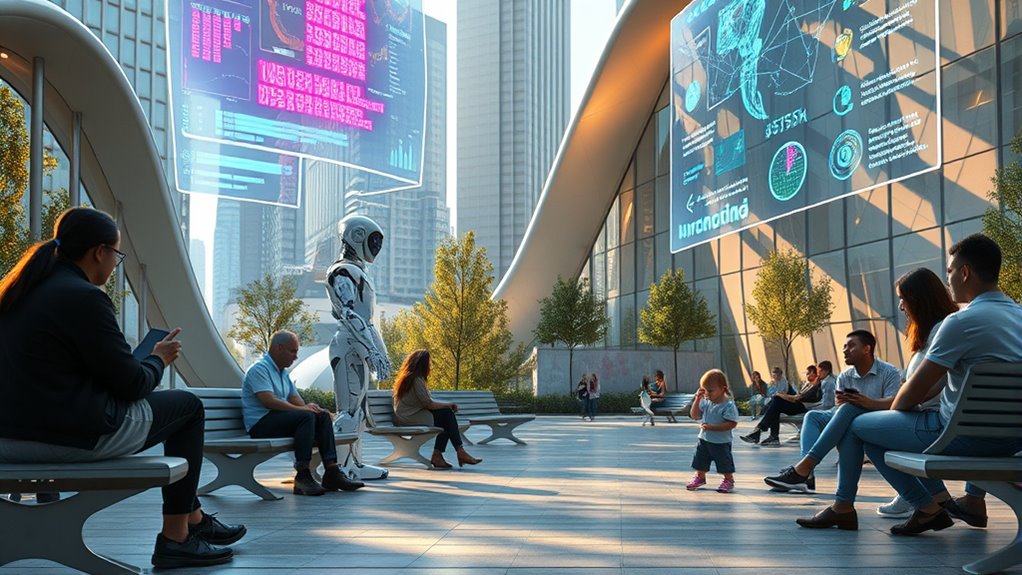
As machines take on more roles and manage identities alongside us, your understanding of what makes you unique is being challenged. This shift pushes you to reconsider notions of self-agency as automation influences decision-making and personal boundaries. In this evolving landscape, redefining human identity means embracing a new sense of agency and purpose amid a world where machines and humans coexist and collaborate. Managing this surge of machine identities is critical to maintaining trust and security in our digital ecosystems. The integration of innovative indoor gardening solutions, such as unique planters and water management systems, exemplifies how human creativity adapts to an increasingly automated environment.
Human Uniqueness Challenged
In a world increasingly shaped by AI, the very essence of what makes humans unique comes into question. AI often reduces people to numbers, scores, or rigid parameters, oversimplifying human complexity and risking dehumanization. Voice data captures sensitive emotional and personal traits, raising privacy concerns and influencing how you communicate. To fit AI expectations, you might alter your natural speech, leading to less genuine self-expression. This oversimplification hampers AI’s ability to grasp nuanced preferences, which can result in misguided decisions about your identity. Your unique qualities—like emotional intelligence, ethical reasoning, and empathy—remain beyond AI’s reach. These human traits are vital in social interactions, relationship building, and complex judgment, making your human essence irreplaceable in a machine-augmented world. The human brain’s complexity supports nuanced thinking and moral judgment, underscoring the limitations of AI in replicating authentic human experience. Furthermore, cognitive diversity plays a crucial role in fostering innovative solutions and adapting to unforeseen challenges, highlighting the irreplaceable nature of human adaptability in an AI-driven landscape.
Identity in Flux
How do you redefine your sense of identity when machines now outnumber humans in digital spaces? As machine identities like API tokens and automation tools dominate, your traditional view of self no longer fits. These non-human identities outnumber humans by ratios up to 80:1, blurring lines between individual and machine roles. The rapid growth of NHIs suggests a digital landscape where automated entities shape your environment, challenging your understanding of personal and organizational identity. You might feel disoriented as your digital footprint becomes intertwined with countless machine counterparts, creating fragmentation and complexity.
| Human Identity | Machine Identity | Organizational Impact |
|---|---|---|
| Unique attributes | Automated functions | Blurred boundaries |
| Personal agency | Autonomous operation | Security vulnerabilities |
| Self-perception | Digital presence | Trust challenges |
| Evolving roles | NHIs proliferation | Identity management issues |
Redefining Self-Agency
The integration of AI into daily life is transforming your sense of self-agency, pushing you to reconsider how much control you truly hold over your decisions. As AI systems increasingly handle introspection, emotional regulation, and moral reflection, you might find your reliance growing, potentially eroding your emotional awareness and subtle negotiation skills. Delegating inner work shifts your relationship with your emotions, risking detachment from authentic experiences. Meanwhile, the debate about AI’s influence on autonomy intensifies—many believe future AI may limit your control, while others see potential for empowerment. With advances like superagency, AI can amplify your creativity and productivity, but only if thoughtfully deployed. Ultimately, your sense of identity and agency depends on how society designs and integrates these technologies, balancing empowerment with preservation of human control. Societal norms and regulations will play a crucial role in shaping whether AI enhances or diminishes individual autonomy in the long run. Additionally, understanding the Relationships – Personality Test concepts can help individuals navigate the changing landscape of human connection and self-awareness in an AI-augmented world.
The Impact of AI on Social and Emotional Intelligence
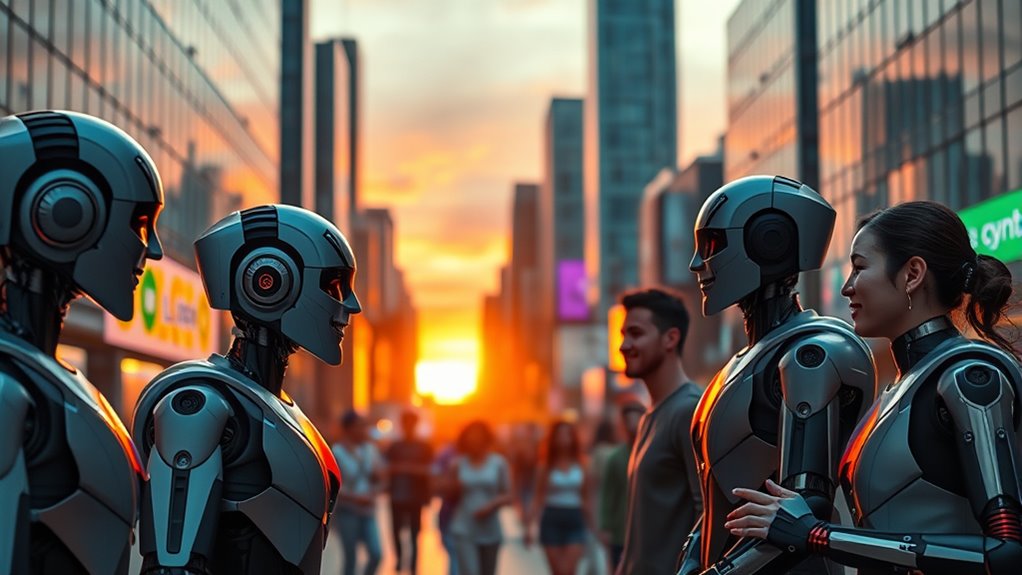
AI influences how you build empathy and trust, often replacing genuine human interactions with algorithmic responses. As technology becomes more integrated into daily life, it can weaken shared social norms and challenge authentic connections. Understanding these shifts is vital to maintaining meaningful relationships in an AI-driven world. AI’s impact on social skills development highlights the importance of fostering emotional intelligence alongside technological literacy. Moreover, local culinary experiences like those found at Culinaria De Gustibus Bistro or Osteria Del Teatro offer opportunities for genuine human interaction that can help reinforce social bonds.
Erosion of Empathy
As digital interactions become more prevalent, concerns grow that artificial intelligence may erode genuine empathy by altering how people develop social and emotional skills. You might find yourself forming pseudo-intimate bonds with AI platforms, which can fulfill emotional needs but replace authentic human connections. This shift risks reducing your ability to recognize and respond to real emotional cues. AI’s influence on emotional development includes:
- Increasing reliance on AI chatbots for advice, potentially hindering real relationship-building
- Exposure to AI-generated misinformation affecting emotional judgment
- Emotional AI blurring lines between genuine feelings and algorithmic responses
- Nearly 2 in 5 U.S. adults feel a sense of connection with digital assistants (38%) highlighting widespread humanization of AI
Furthermore, the growing use of AI in social contexts raises questions about the long-term effects on emotional intelligence development, which is essential for maintaining meaningful human relationships. While AI can boost emotional intelligence, overdependence may lead to superficial interactions that weaken your capacity for empathy, ultimately impacting meaningful human relationships.
Trust in Shared Norms
Growing reliance on AI in social interactions reshapes how trust is built and maintained within relationships. As AI simulates complex social scenarios, it influences your ability to develop empathy, self-awareness, and relationship skills. Adaptive tools help educators and individuals identify effective strategies, fostering social-emotional learning and inclusivity. However, AI’s role in generating pseudo-intimacy and emotionally manipulative outputs blurs the line between genuine and artificial bonds, challenging traditional trust mechanisms. When students seek AI advice on relationships, it shifts trust dynamics, potentially undermining human connection. Emotional AI evokes responses that can influence your social identity and redefine interaction norms. While AI offers mental health support and emotional resilience, over-reliance risks eroding authentic trust in shared social norms, raising ethical and trustworthiness concerns. Furthermore, the integration of AI into social contexts underscores the importance of understanding resources and tools available to support healthy relationship development and maintain genuine human connections.
Navigating Moral and Ethical Challenges in AI Integration
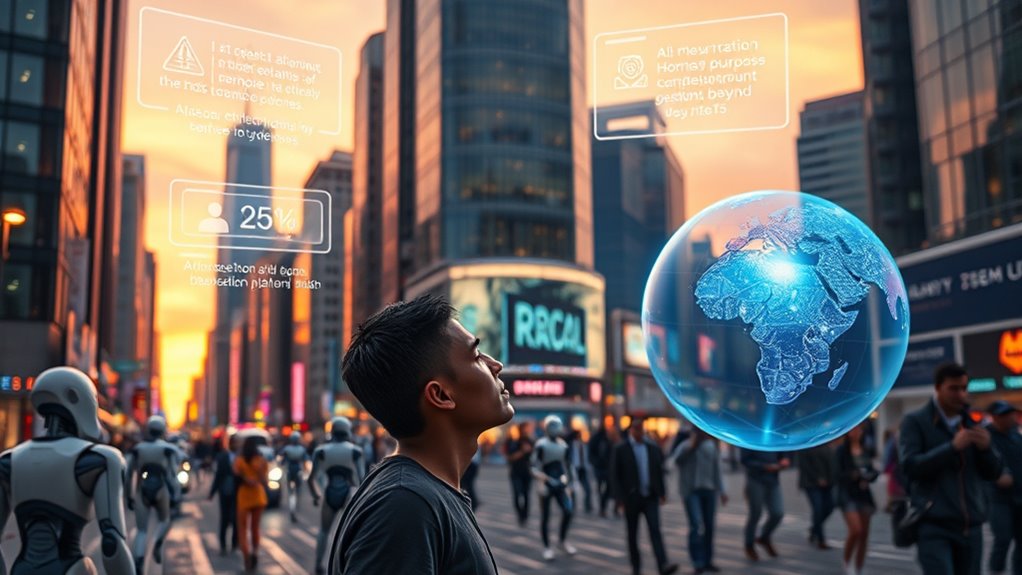
Guiding the moral and ethical challenges of AI integration requires careful attention to issues like bias, transparency, privacy, and human control. You must recognize that AI systems often perpetuate existing biases, especially when trained on non-representative data, risking discrimination and health disparities. Transparency is also critical; many AI models operate as “black boxes,” making it hard to understand or challenge decisions. Privacy concerns arise from extensive data collection involving sensitive information, demanding strict safeguards and legal compliance. Human control remains essential, especially in high-stakes areas like justice or defense, where autonomous decisions could diminish accountability. To navigate these challenges, consider:
Address AI ethics with fairness, transparency, privacy safeguards, and human oversight to ensure responsible integration.
- Implementing fairness-driven algorithms and ongoing bias monitoring
- Establishing transparent, auditable systems aligned with ethical standards
- Ensuring human oversight to maintain accountability and moral judgment
- Recognizing the importance of Halloween traditions and cultural sensitivities in AI applications can help prevent misinterpretations and promote respectful engagement with diverse communities.
The Evolving Landscape of Work and Human Contribution

The landscape of work is rapidly transforming due to AI and automation, reshaping both the types of jobs available and the skills required to succeed. By 2030, nearly 30% of U.S. jobs could be fully automated, with 60% experiencing significant AI-driven changes, making upskilling essential. Roles like clerical work, bank tellers, cashiers, and routine manufacturing jobs face declines, but AI also creates 170 million new jobs globally, emphasizing complex cognitive and human-AI collaboration roles. AI boosts productivity, with knowledge workers seeing 66% improvements, shifting focus from manual tasks to strategic, creative, and interpersonal work. Organizational workflows now involve oversight, maintenance, and ethical management, fostering a hybrid human-AI environment that demands new skills like data literacy and technology interaction. Additionally, the rise of AI-driven security systems underscores the importance of understanding cybersecurity in the evolving workplace.
Psychological Well-being and the Search for Meaning

As automation changes your work environment, you might find your sense of purpose shifting or diminishing. This can challenge your emotional resilience, making it harder to cope with ongoing uncertainty. Reimagining your life’s purpose becomes essential to maintain well-being in a society where traditional roles no longer define meaning. Embracing personal sanctuary within your space can help foster a sense of stability and self-connection amidst external changes.
Impact on Emotional Resilience
Artificial Intelligence profoundly influences emotional resilience by reshaping how you manage psychological well-being and seek meaning in your life. AI-enabled mental health tools offer continuous support, such as reminders for medication, analyzing behavioral data to detect depression signs, and monitoring mood shifts through social media. These tools foster proactive interventions and create virtual communities that connect you with shared coping strategies. Additionally, AI provides real-time feedback, boosting your confidence and helping you overcome setbacks, which strengthens emotional resilience.
- AI tracks behavior and mood changes, enabling early intervention.
- Virtual support groups enhance social connection and shared coping.
- Personalized feedback builds confidence and promotes emotional growth.
- The integration of data privacy challenges into AI mental health solutions emphasizes the importance of safeguarding sensitive information, ensuring trust and compliance in these supportive technologies.
Reimagining Life’s Purpose
Automation reshapes not only how you manage your mental health but also prompts you to reconsider what gives your life purpose. As work becomes less central, you’re encouraged to explore intrinsic values like creativity, spirituality, or community. This shift allows you to redefine success, focusing on personal fulfillment rather than job titles or economic status. Societal support for diverse purpose-finding avenues helps reduce existential anxiety. You might find meaning through lifelong learning, volunteering, or spiritual practices, fostering psychological well-being outside traditional employment. This transformation emphasizes agency in shaping your identity and purpose amid economic changes. Recognizing the importance of personal fulfillment can guide you toward more meaningful pursuits beyond conventional work frameworks.
Trust, Norms, and Values in an AI-Driven Society

Trust forms the foundation of an AI-driven society, yet it remains a complex and multifaceted social value. You must recognize that trust hinges on qualities like competence, transparency, and fairness, which often conflict or overlap. Building trust involves steering through:
- Public doubts about AI outputs, human handlers, and regulatory oversight
- The need for robust governance through public-private partnerships (PPPs)
- The importance of ethical principles such as beneficence, justice, and explicability
- Ensuring that quality standards for AI systems are consistently met to foster confidence and reliability
Despite widespread support for trustworthy AI principles, many still feel uncertain, especially around job security and AI’s societal role. Only a minority of AI models meet high transparency standards, highlighting trust gaps. Effective governance and clear norms are essential to bridge these divides and foster societal confidence.
Opportunities for Creativity and Innovation Beyond Automation
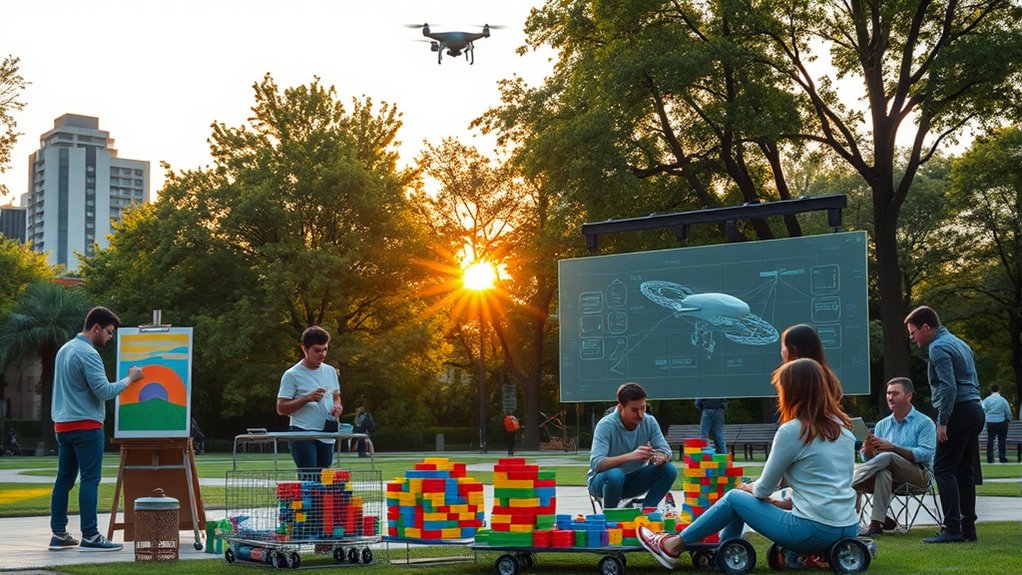
While AI often gets associated with automation, its true potential lies in expanding human creativity and fueling innovation. You can leverage AI to augment your artistic expression, exploring new ideas through techniques like Sheena Iyengar’s “Think Bigger” method, which integrates AI to generate meaningful innovations. Historically, technology like photography revolutionized painting, showing that new tools inspire reinvention, not obsolescence. AI helps combine diverse data sources, opening new creative frontiers and solution pathways. In business, human-AI collaboration boosts sales, reduces costs, and accelerates market entry, while in individual creativity, access to AI-generated ideas increases novelty and usefulness. Additionally, understanding financial terms can help you make better decisions about investing in innovative tools or strategies. These opportunities empower you to push boundaries, craft novel solutions, and foster innovation, proving AI’s role as a catalyst for creativity beyond mere automation.
Preparing Future Generations for a Post-Labor Existence
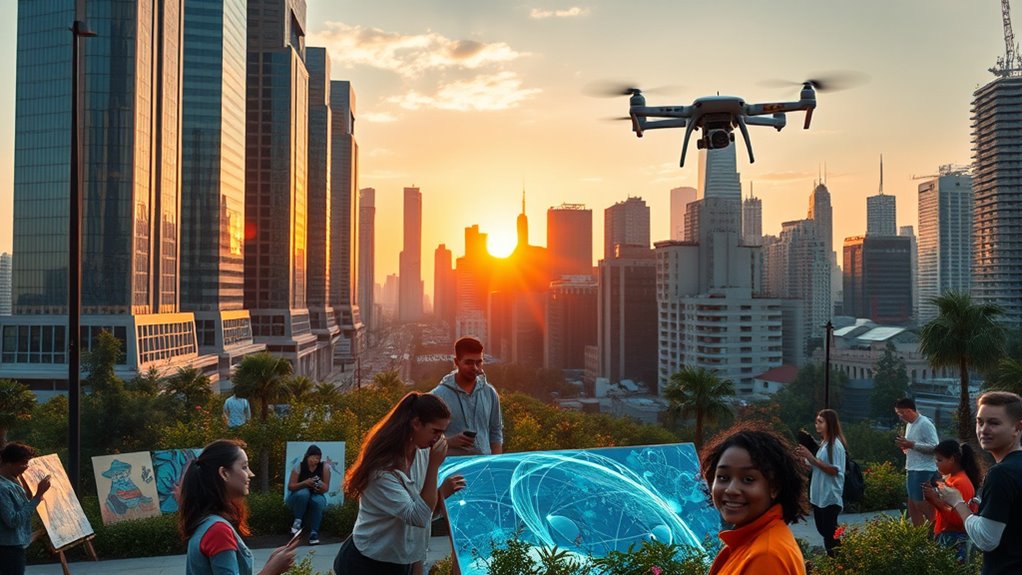
As AI continues to reshape how work is defined, preparing future generations requires rethinking education and skills development. You’ll need to focus on cultivating skills like creativity, resilience, and technology literacy, essential in a post-labor world. Emphasizing lifelong learning helps people adapt to rapid changes, while integrating AI into education enhances learning experiences. To prepare effectively, consider:
- Updating curricula to prioritize adaptable, human-centered skills
- Promoting continuous learning and reskilling initiatives
- Ensuring global access to education through technology
- Incorporating specialized vacuum attachments and other modern tools into skill-building and practical learning environments
These steps help bridge skill gaps and equip future generations to thrive beyond traditional employment. By fostering diverse abilities and expanding learning opportunities, you set the foundation for a resilient, innovative society ready for a post-labor future.
Charting a Path Toward Human-Centered AI Development

Charting a path toward human-centered AI development requires a clear focus on core principles that prioritize human values and ethical considerations. You should guarantee AI respects human autonomy by supporting decisions rather than replacing them. Emphasize fairness and bias reduction to treat everyone equally, avoiding discrimination. Transparency and explainability are essential so users understand how AI makes decisions, fostering trust. Accountability must be embedded, with clear responsibility when harm occurs. Privacy by design protects individual data rights during deployment. Additionally, integrate human needs by aligning AI outputs with societal values, involving users throughout development, and designing accessible systems to reduce digital divides. Moreover, incorporating AI in Business applications thoughtfully can enhance societal well-being while mitigating potential risks. Ultimately, you must maintain human oversight, ensuring meaningful control, interpretability, and final authority, especially in high-stakes areas like healthcare and justice.
Frequently Asked Questions
How Can Humans Find Purpose Beyond Traditional Employment in an Ai-Driven World?
You can find purpose beyond traditional employment by engaging in activities that foster personal growth, creativity, and community. Focus on learning new skills, volunteering, and building meaningful relationships. Embrace hobbies and pursuits that bring joy and fulfillment. By connecting with others and contributing to causes you care about, you create a sense of purpose rooted in your passions and impact, not just your job. These avenues enrich your life and sustain your well-being.
What Strategies Can Foster Emotional Resilience Amid Widespread AI Integration?
To foster emotional resilience amid widespread AI integration, you should focus on developing your emotional intelligence through mindfulness, journaling, and cognitive reframing. Engage in resilience training programs, both online and in person, that target stress management and adaptive skills. Prioritize your well-being with flexible schedules and support networks, and embrace micro-interventions to build confidence. By staying proactive and open to growth, you’ll better manage stress and thrive in evolving work environments.
How Will AI Influence Global Cultural Norms and Shared Societal Values?
AI acts like a mirror held up to the world, reflecting and reshaping our cultural norms and shared values. It weaves a tapestry of influences, blending diverse traditions and ideas, but also risks distorting the picture with biases. You’ll find society’s compass shifting, as AI influences what we celebrate, believe, and prioritize. To navigate this evolving landscape, you must stay conscious of the stories AI tells and challenge its hidden biases.
Can AI Truly Support or Enhance Human Creativity and Innovation?
Yes, AI can genuinely support and enhance your creativity and innovation. It acts as a powerful tool, helping you generate novel ideas by combining diverse information sources. By collaborating with AI, you can explore new artistic and problem-solving frontiers, refine your work faster, and push beyond traditional limits. However, it’s essential to balance reliance on AI with your unique insights to maximize its creative potential without diminishing your innate imaginative skills.
What Policies Are Necessary to Ensure Ethical AI Development and Deployment?
You need to implement robust policies that set the gold standard for ethical AI. Establish strict governance frameworks, create oversight committees, and enforce transparency and accountability measures. Regularly assess and mitigate biases, ensure privacy and security, and involve diverse stakeholders in decision-making. These policies aren’t optional—they’re your shield against misuse, guaranteeing AI serves humanity’s best interests while preventing disastrous consequences. Without them, AI could spiral out of control and cause irreversible harm.
Conclusion
As AI transforms our world, remember that over 70% of people believe technology will redefine human purpose beyond just work. You have the chance to shape a future where your creativity, empathy, and moral values lead the way. By embracing this shift, you can help build a society that values human contribution in new, meaningful ways—creating a future where purpose thrives beyond automation. Your choices today will define the post-labor era.

